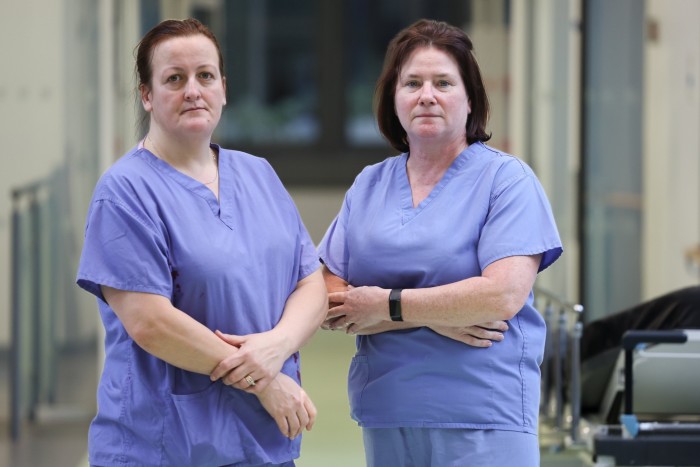Northern Ireland’s health minister is battling to stave off the prospect of winter strikes that would pile fresh pressure on hospitals whose waiting lists are already by far the longest in the UK.
The threat of a walkout by nurses, paramedics and other health staff if their pay drops below that of their counterparts in Britain comes after teaching unions this week announced plans to hold a strike ballot before Christmas.
“It’s an absolute disgrace. We’re the poor relations in Northern Ireland,” said Kelly McGettigan, 49, a stock controller in Belfast’s Royal Victoria Hospital whose job entails ordering equipment needed for brain surgery.
“We are all part of the UK and should be paid the same — if they don’t have the money, we can’t just sit back and say that’s OK,” echoed Monica Auld, 52, a theatre support nurse.
The NHS is struggling across the UK but nowhere is it sicker than in Northern Ireland. Hospitals are ground zero of the Stormont executive’s efforts to balance its budget without inflicting “catastrophic cuts” to already crumbling public services.
The region’s waiting lists are at record highs. Over 126,000 people were waiting more than two years for a first consultant-led outpatient appointment, according to the latest full official data from September 2023. That was more than 1,000 times higher than the 113 currently waiting for the same time in England.
More than a fifth of patients now face 12-hour waits to be treated, admitted, discharged or transferred from emergency departments. That is equivalent to nearly 32,000 people, 19 times more than six years ago, but health workers say salary increases are needed to help retain staff.
The median waiting time for a first outpatient consultation is over a year and can stretch to more than five years, a full two years longer than in 2020. Only just over a third of cancer patients with an urgent GP referral start treatment within the official 62-day target.
Against that backdrop, Northern Ireland’s nurses and health workers had been recommended the same 5.5 per cent pay rise for 2024-25 as in England and Wales.
But Mike Nesbitt, health minister, said this week there was not enough money to honour the pledge. He instead offered to pay the 5.5 per cent increase that was to have taken effect in April 2024 from August this year, with a promise to make up the difference at a later date.
But some union leaders believe that only equates to an annual 3.6 per cent rise. “We agreed to continue negotiations whilst waiting on some clarity on points raised,” said Brenda Stevenson, lead health negotiator at union Unite.

Before talks with the minister, she warned that “under no circumstances” would unions accept less and if no deal was reached, they would ballot members before Christmas on holding the sector’s third pay strike since 2019.
The health service in Northern Ireland is struggling financially but experts say money is not the only problem.
Repeated political crises that have paralysed the Stormont executive for years have delayed much-needed reforms and politicians have postponed unpopular decisions.
“You cannot keep saying we don’t have enough money,” said Deirdre Heenan, professor of social policy at Ulster University. “This is about government and choices and setting priorities.”
The health ministry already swallows more than half of Stormont’s annual budget and received £350mn last week, when the executive shared out more than £630mn in extra funding for the region from the UK Treasury.

That cash came after the UK government provided a £3.3bn package to help restore the executive in February after two years on ice amid a row over Brexit trade arrangements. The October UK Budget also included a bigger than expected £18.5bn for Northern Ireland in 2025-26.
But at the Royal Victoria Hospital, patients on trolleys lined the corridor in the overflowing emergency department and staff morale was low.
Paramedic Brendan Rice, 49, said he was regularly stuck in his ambulance for hours waiting to deliver patients, unable to respond to calls from his radio dispatcher asking for crews to attend to emergencies.
“I have no doubt that people are dying,” he said.
Once they are admitted, “patients are a lot sicker because their treatment has been delayed”, said Hannah Lelis, 39, a recovery nurse originally from the Philippines.
Amid the salary pressures, she has considered moving to Australia, a popular destination for colleagues seeking better pay. “Everything is increasing,” she said, citing rent, electricity and mobile phone charges, “but our salary is stagnating”.
McGettigan, meanwhile, said the funding squeeze meant she has had to resort to asking medical suppliers for discounts. “All the companies we deal with are all putting their prices up,” she said.
Nevertheless, Stormont — which relies on an annual grant from the UK government for most of its funding — has no choice but to live within its budget this year.
If it does not, it will have to repay £559mn borrowed from the Treasury after past overspends.
The executive blames the UK for funding the region below its needs for years. The UK government in turn sees Stormont finances as a “leaky bucket” and wants the region to raise more revenue itself, such as by introducing water charges, which it has long resisted, and increasing rates or university fees.
Esmond Birnie, a member of the Northern Ireland Fiscal Council, an independent budget watchdog, said that may now prove inescapable.
“We can’t just rule everything out. We do have fundamental funding challenges and health is a large part of it,” he said.
Data analysis and visualisation by Clara Murray












